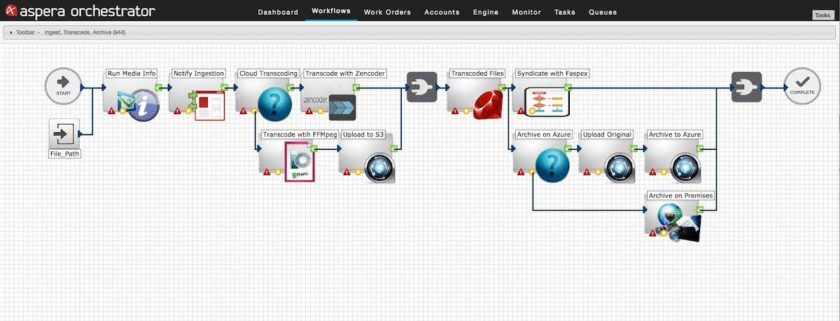M+E Connections

Aspera Touts Latest Enhancements to Orchestrator
Story Highlights
Several enhancements have been made to Aspera’s Orchestrator web-based application and software development kit (SDK) platform already this year, and additional enhancements are planned when Orchestrator 3.0 is introduced at the 2017 NAB Show in Las Vegas, April 22-27, according to Pavan Mukthi, a software architect at the IBM-owned company.
The recently added enhancements include two new plugins that enable the automation of file and digital package upload and download to Aspera Files within a simple Orchestrator workflow, he said during a webinar March 15 on “Automating Cloud Collaboration Workflows with Aspera Orchestrator and Aspera Files.”
The Aspera Files Package Watcher and Package Delivery plugins interface with the Aspera Files software-as-a-service (SaaS) solution via the Files application programming interfaces (APIs) and use a “state-of-the-art authentication mechanism to keep the communication encrypted and the data safe,” according to the company. There were also upgrades made to existing plugins, Mukthi said during the webinar.
Aspera, meanwhile, enhanced Orchestrator with “various performance fixes,” bug fixes, and “configuration file changes that users can take advantage of to improve” performance, he said.
The company also added “offline documentation for users who are not connected to the Internet, to be able to find help material when using” Orchestrator, he said. There’s also new API methods “to get more information out of the backend database” of Orchestrator about runtime data and other functions, he said.
“Some of the key” benefits of using Orchestrator to integrate with Files include the ability to take advantage of the “robust” APIs of Files, the ability to reduce the manual steps that are needed to procure or deliver a package, the assistance it provides in high volume cases by increasing efficiency and eliminating human errors, and saving a lot of time, he said.
Orchestrator “enables precise control over the Aspera high-performance file transfer environment,” according to the company’s web site. It allows organizations to “build efficient, predictable file processing pipelines that interconnect business units and external partners,” Aspera said, adding that, with Orchestrator, files can be “directed, processed and redirected with easy-to-define rules based on an organization’s workflows and using existing IT infrastructure.”
Aspera automation “streamlines complex workflows, integrates seamlessly with third-party plug-ins and ensures that each processing step is accurately performed,” it said.
Use cases for Orchestrator include high-volume processing and transformation, secure contribution and distribution, and receiving content and data at high speeds.
That’s because Orchestrator “scales fluidly and reliably for the extreme processing required by” big data workflows including high-volume video encoding, content ingest and distribution, verification and consolidation of scientific research data, or enterprise data collection and organization, according to Aspera.









